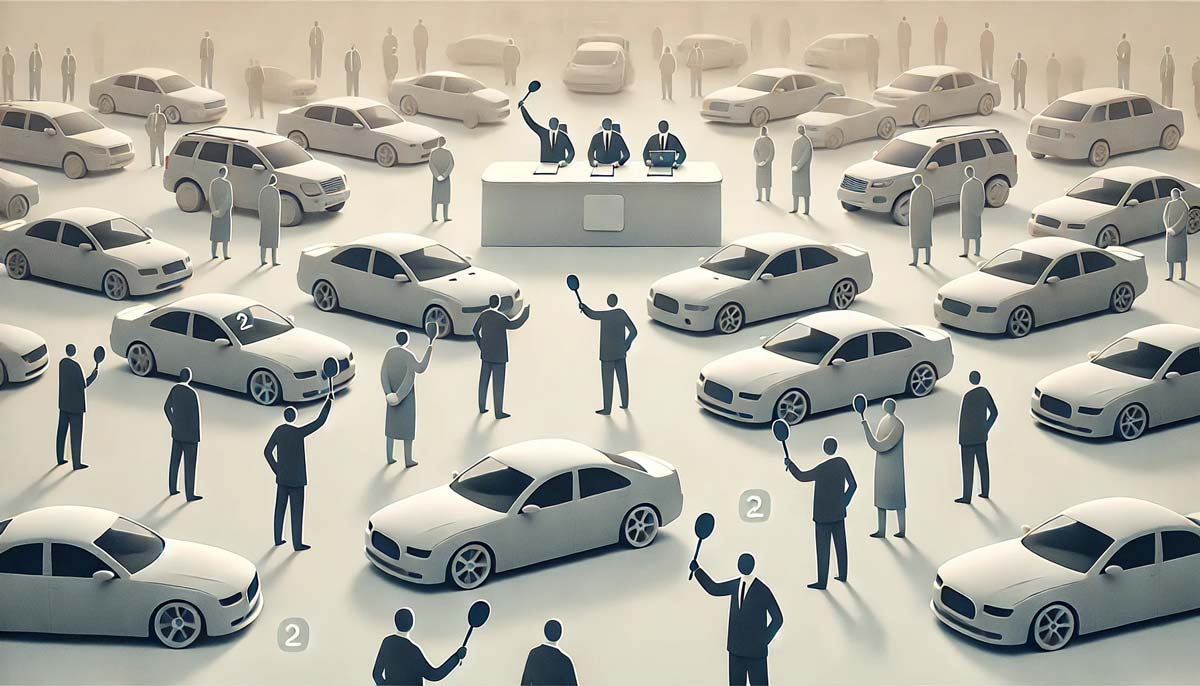 https://auction.ridesafely.com/images/2018/10/banner-truck-auctions-for-everyone.jpg
865
1440
RideSafely
/images/2025/01/ridesafely-logo.svg
RideSafely2025-09-26 12:10:232025-09-26 14:53:10How to Buy Your Next Truck at an Auto Auction
https://auction.ridesafely.com/images/2018/10/banner-truck-auctions-for-everyone.jpg
865
1440
RideSafely
/images/2025/01/ridesafely-logo.svg
RideSafely2025-09-26 12:10:232025-09-26 14:53:10How to Buy Your Next Truck at an Auto AuctionSalvage car auctions offer an enticing avenue for those looking to purchase a vehicle at a significantly reduced price. Unlike traditional car dealerships, where prices can be steep, salvage auctions present a unique opportunity to snag a bargain. These auctions feature vehicles that have been involved in accidents and deemed total losses by insurance companies, often selling for far less than their market value.
What is a Salvage Auction?
Salvage auctions are specialized events where insurance companies sell off vehicles that have been written off due to significant damage from accidents. Traditionally, these auctions were only open to licensed auto dealers, but now, platforms like RideSafely have made them accessible to the general public.
Learn more about how to navigate these platforms effectively in our comprehensive guide, Navigating the World of Online Salvage Car Auctions with RideSafely.
The Appeal of Salvage Cars
At a salvage auction, vehicles that insurance companies have labeled as total losses are up for grabs. This designation typically means the repair costs are deemed to exceed 70% of the vehicle’s pre-accident value. However, these vehicles often sell for even less, making them incredibly appealing to savvy buyers who are willing to take on a project.
Buyer Beware: The Risks of Salvage Auctions
Purchasing a vehicle from a salvage auction is not without its risks. These cars are sold as-is, with no warranties, guaranteeing nothing about their condition. Buyers must rely on their judgment and possibly a mechanic’s expertise to determine the extent of damage and the feasibility of repair.
The Potential for Repairs
Despite the risks, the potential for repairs can make salvage vehicles a worthwhile investment. Many cars at these auctions have damage that might appear severe but affects only cosmetic aspects or parts easily replaced with recycled materials. For those with mechanical skills or access to professional repair services, these cars can be restored to roadworthy condition at a fraction of the cost of similar, undamaged vehicles.
For a deeper understanding of salvage titles and how to identify common types of damage, read our detailed guide on Decoding Salvage Titles: A Buyer’s Guide to Identifying Common Damage.
Making a Smart Purchase at a Salvage Auction
To successfully purchase from a salvage auction, it’s crucial to have a good understanding of car mechanics or bring along an expert who can assess the vehicle thoroughly. It’s important to inspect each potential buy carefully to avoid costly mistakes. Knowledgeable buyers can indeed find great deals, turning what might initially seem like a heap of scrap into a fully functional vehicle.
Gain further insights into mastering these auctions by checking out our article on Unlocking the Secrets of Success in Online Salvage Car Auctions.
The Bottom Line on Salvage Auctions
Salvage car auctions are an excellent resource for those who are car savvy, willing to undertake repairs, and looking to save money. While they do pose risks, the financial rewards can be significant, making them an appealing option for the right buyer.
Salvage auctions are not just a source of cheap vehicles; they are a test of one’s ability to spot potential and make wise decisions under risk. For those equipped with the right knowledge and skills, these auctions are a goldmine of opportunities for substantial savings on car purchases.
If you’re considering purchasing a vehicle from a salvage auction, knowing the ins and outs of salvage titles is essential. For a comprehensive understanding, read our detailed FAQ on the topic at Understanding Salvage Titles: A Comprehensive Overview. This information will help you make more informed decisions.
Essential FAQs for Navigating Salvage Car Auctions
What is a salvage car auction?
A salvage car auction is a sale where insurance companies dispose of vehicles that have been declared total losses after accidents. These vehicles are sold to the highest bidder, often at significantly reduced prices compared to regular market values.
Can anyone attend a salvage car auction?
Yes, while salvage auctions were traditionally limited to licensed auto dealers, many are now open to the public. Companies like RideSafely offer access to these auctions, allowing everyday consumers to participate.
What does it mean when a car is labeled as a "total loss"?
A car is considered a total loss when an insurance company determines that the cost of repairs would exceed a certain percentage (typically 70%) of the vehicle’s value before it was damaged. This threshold can vary based on local regulations and individual insurer policies.
Are there any guarantees or warranties with salvage cars?
No, vehicles purchased at salvage auctions come with no warranties or guarantees. Buyers purchase the cars “as-is” and must assess the risk and potential for repairs themselves.
What should I look out for when buying a car at a salvage auction?
It’s crucial to thoroughly inspect any vehicle you’re considering buying. Look for the extent of physical damage, potential hidden issues, and evaluate the cost of necessary repairs. If possible, consult with a knowledgeable mechanic to assist with the evaluation.
Is it possible to insure a salvage car?
Yes, you can insure a salvage car. Once it has been repaired, the vehicle must pass a state inspection to be certified as roadworthy and qualify for insurance. However, the insurance options and premium rates might be more restrictive compared to those available for vehicles with clean titles. For detailed guidance on obtaining insurance for salvage and rebuilt title vehicles, click here to learn more.
How much can I save by buying a salvage car?
Savings can be substantial, often ranging from 50% to 75% off the vehicle’s market value. The exact amount will depend on the auction, the car’s condition, and how much you spend on repairs.
Can I sell a car that I’ve repaired from a salvage auction?
Yes, you can sell a repaired salvage vehicle. However, it must be disclosed that it has a salvage title, which can affect its resale value and attractiveness to potential buyers.
What are the risks of buying from a salvage auction?
The primary risks include purchasing a vehicle with extensive damage that may not be economically feasible to repair. There’s also the risk of unforeseen mechanical issues that emerge after purchase.
Are salvage auctions suitable for everyone?
Salvage auctions are best for those who have significant automotive repair knowledge or access to expert advice. They are less suitable for individuals unfamiliar with car repairs, as the risk of encountering costly issues post-purchase can be high.






Leave a Reply
Want to join the discussion?Feel free to contribute!